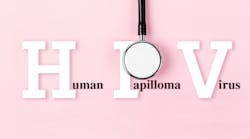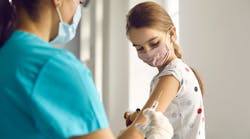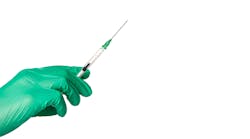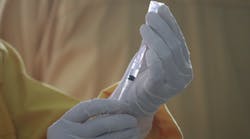Picture the average public high school in the state that would have about 600 students in it. That’s close to the number of people in the state who get a cancer related to the human papillomavirus (HPV) each year. To Hollings Cancer Center researcher Kathleen Cartmell, PhD—who knows there’s a vaccine that can prevent those cancers—that’s not OK.
The public health researcher spends a lot of time working with state partners and conducting research to optimize strategies in the state to get adolescents and young adults vaccinated against HPV-related cancers. The HPV vaccine is extremely safe and effective, and it can dramatically help lower the number of HPV-related cancers. There is an urgency right now to let parents and pediatricians know about their critical role in protecting children with the vaccine at an age when children’s immune systems offer the best protection.
Spearheading those efforts led by Cartmell is the Hollings Cancer Center that has launched a $700,000, three-year HPV Initiative. Working in conjunction with numerous statewide partners including the South Carolina Cancer Alliance and the American Cancer Society, the cancer center has prioritized this as one its top cancer prevention outreach projects.
In 2016, South Carolina had the lowest rate of HPV vaccine completion among adolescent girls in the U.S. (30.8 percent) and second-to-last for up-to-date vaccination among adolescent boys (27.4 percent), according to the 2017 National Immunization Survey Teen report from the CDC, an annual survey that estimates vaccination coverage among adolescents aged 13 – 17 years.
The good news is that efforts already are paying off. South Carolina had the third largest increase in HPV up-to-date vaccination status from 2016 to 2017, making substantial gains to 59.6 percent for one dose and 42.7 percent, UTD vaccination.
Cartmell and collaborators conducted an environmental scan study in 2016 to find out why the state ranked so low in its vaccination rate, particularly given that a neighboring state Georgia had one of the highest vaccination rates. Using these findings, Hollings Cancer Center set goals for its HPV Initiative that includes three parts:
1. Engaging provider healthcare organizations across the state in addressing HPV vaccination through educational efforts and awareness events.
2. Carrying out a social and digital media campaign to educate parents and adolescents about HPV vaccination.
3. Fostering a partnership with four health systems in the state, providing funding for customized, targeted work within their health systems to dramatically increase HPV vaccination through clinical and administrative strategies.
The health systems partnership, that has its kickoff last month, went over overwhelmingly well. The four health system partners are PRISMA Health (formerly Greenville Health System), McLeod Regional, MUSC Health Department of Pediatrics and Spartanburg Regional. Each health system will receive $50,000 grants to develop and implement clinical strategies to improve HPV vaccination rates.




